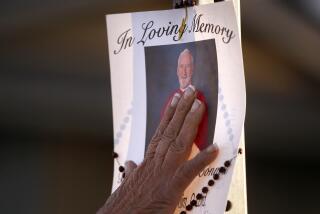Some Married Men Aren’t Faithful, but We Don’t Say Marriage Is a Failure : Celibacy: Recent scandals notwithstanding, there are good reasons for priestly abstinence. We just shouldn’t be so shocked at human frailty.
- Share via
It’s the silly season on celibacy in the Catholic Church. The tragicomedy of the Archbishop of Atlanta, and psychologist A.W. Richard Sipe’s new book ripping apart priestly celibacy, have evoked mock horror from the national media, an Oprah Winfrey show (can Geraldo be far behind?) and foolish comments from those priests and former priests who comment routinely on Catholic matters for the media in the absence of official spokespersons with any credibility.
It’s time someone says what is obvious truth: Celibate priests are about as happy and well-adjusted and emotionally mature as married men of the same age and educational background, who sometimes aren’t all that ecstatic with their lot. Those of us who like the work of priests are no less content with life than married men who like their wives. Moreover, unlike Sipe’s estimate that no more than 50% of priests are celibate at any given time, my assertions are not guesses but are based on national sample data.
A priest-theologian who comments on everything says that the Atlanta case proves that celibacy is at dead end. Come on! Archbishop Eugene Marino is the first bishop in history to have a mistress? Priests are humans, like everyone else, and have through the course of history made all the mistakes and been liable to all the frailties of other humans.
Even bishops are human, though some not obviously so.
My reaction to the Atlanta situation is to thank heaven that, given the present problems in the church, the lover wasn’t another man or a little boy.
As for support and respect for priests, which some “experts” claim is declining, such experts haven’t spent much time out in the parishes. The laity say that the priest, as religious leader, is more important than he ever was and have great respect for him, provided he is professionally competent at his work. That’s the rub, of course--there is no substitute for competence.
However wild some of Sipe’s guesses are, there is no point in pretending that some priests are not faithful to their commitments some of the time. Whoever said they were? Some married men are not faithful, either. Some marriages end in divorce. Some marriages are not very happy. Some married men are not very mature. Who said it should be different for priests?
Nor is it to be doubted that only some of us reach a state that Sipe calls “literally sublimated sexual energies”--full celibate sexual maturity. How many married men reach full marital sexual maturity?
Incidentally, someone ought to say that when a man like Sipe, who abandoned his own priestly commitment, accuses those of us who honor it of not doing a perfect job, one hears a bit of axe-grinding in the background, a touch of self-justification, a smidgen of guilt and defensiveness.
Sipe also says that the church has no articulate theory of either celibate commitment or human sexuality and does not prepare men for a celibate life. He gets no argument from me on these points. The church merely says that it’s a rule and that’s that. You gotta keep to the rule because we say it’s the rule. For that reason, many priests are uncertain about the purpose in celibacy and reluctant to recruit young men to the priesthood.
It does not follow that some of us have not worked out a sophisticated and comprehensive rationale for our vocation. Nor does it follow that we don’t like women and are not capable of strong friendships with them that do not violate our vocation.
While supporting the ordination of women and even the idea of limited-term service in the priesthood, we understand that celibacy frees us to serve more people more intensively, that it shows that men can care strongly about women and not necessarily make genital love with them and that celibacy is a fascinating sign of God’s presence in the world. Imagine “Thorn Birds” or even “The Cardinal Sins” about a married cleric: dullsville. Celibates draw attention to the presence of God.
If the church had not tried to pretend for ages that priests were’t subject to human faults (and thus made them inhuman), there would be no grounds for shock when the human frailties of priests were revealed. If Jesus wanted his clergy to be immune from sexual temptations, weaknesses and failings, he would have chosen angels for the job instead of human beings.


